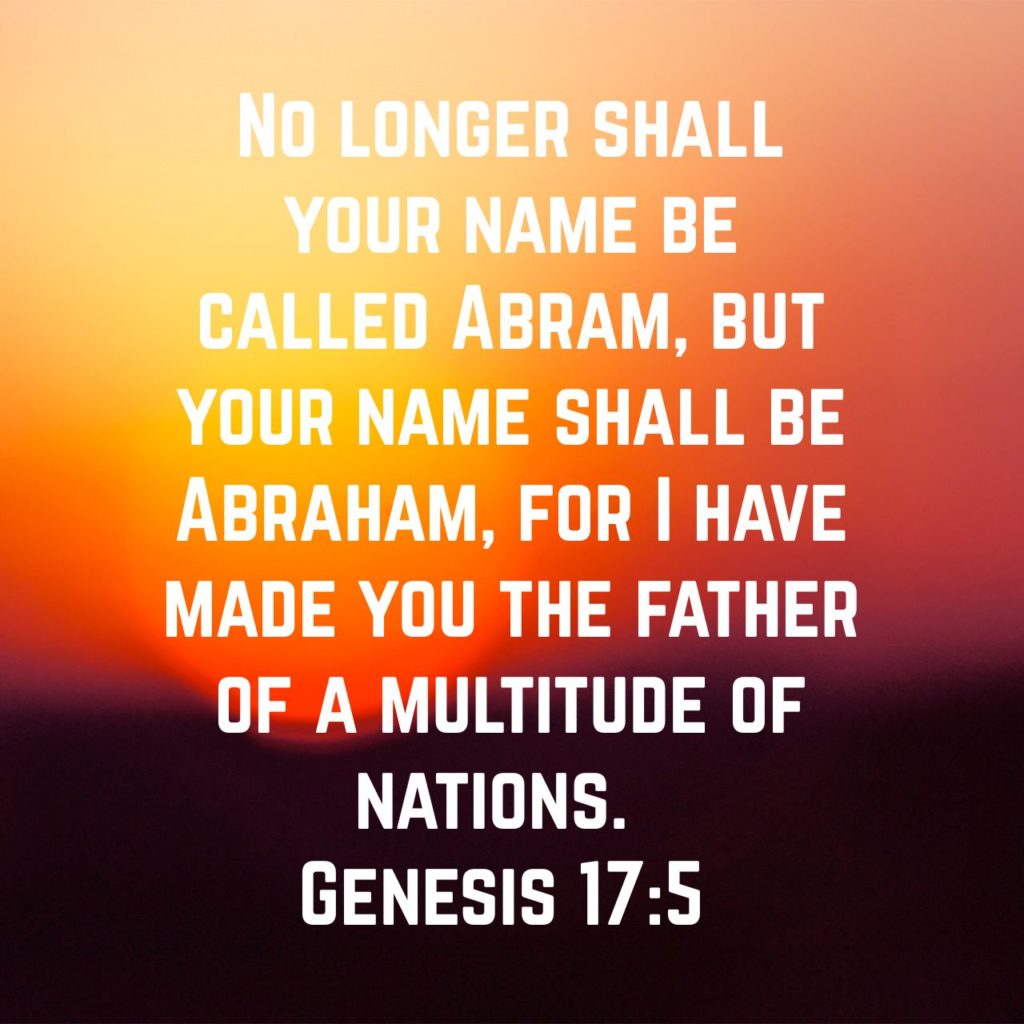
1 When Abram was ninety-nine years old the LORD appeared to Abram and said to him, “I am God Almighty; walk before me, and be blameless, 2 that I may make my covenant between me and you, and may multiply you greatly.”
Thirteen years have passed since the birth of Ishmael, Abram’s attempt to see God’s promise fulfilled on his own terms. God now appears visibly to Abram, as He has before. He doesn’t outright scold Abram for his lack of patience in God’s promise, but gives a subtle reminder to walk blameless before God, or to stay on the path God has for him. God then says that He wishes to make a covenant with Abram. Now Abram and God have already established a covenant. However it seems as though Abram’s actions in regards to Hagar and Ishmael have warranted an extension to the covenant.
God had previously been the only active party in the covenant, making promises that he alone had to fulfill, now he wishes to extend his promises, but will also ask Abram to partake as well. This may be because Abram wasn’t willing to wait for God’s timing to fulfill his covenant promises. In seeing that Abram wanted a more active role, God is extending the conditions of the covenant.
3 Then Abram fell on his face. And God said to him,
The phrase “fell on his face” becomes a common phrase for bowing in worship at a sudden appearance of God. It describes taking a position of absolute humilty before another. Often times it implies a fear of being destroyed in Gods presence, and therefore is an act of begging for mercy and forgiveness. Whether Abram was afraid of God’s sudden appearance before him is unclear. Perhaps Abram realized that he hadn’t waited on God to fulfill His promises, and thus saw a need to repent.
4 “Behold, my covenant is with you, and you shall be the father of a multitude of nations. 5 No longer shall your name be called Abram, but your name shall be Abraham, for I have made you the father of a multitude of nations.
God begins outlining the extensions to the covenant. He offers Abram a new name, to demonstrate the extension of the promise. Abram, the exalted father, becomes Abraham, the father of many nations. While God had previously promised to make Abram into a mighty nation, He now promises to make Abraham the father of a multitude of nations.
Some scholars point out that in changing Abram (Hebrew: AVRM) to Abraham (AVRHM), God inserted part of His own name, “YHWH.” God is not only changing the meaning of Abraham’s name but also tying Himself to this promise.
6 I will make you exceedingly fruitful, and I will make you into nations, and kings shall come from you. 7 And I will establish my covenant between me and you and your offspring after you throughout their generations for an everlasting covenant, to be God to you and to your offspring after you. 8 And I will give to you and to your offspring after you the land of your sojournings, all the land of Canaan, for an everlasting possession, and I will be their God.”
God continues to expand on the promises, echoing his promises before. Abraham will become the father of kings, and to give them the land of Canaan as an inheritance. However, He also notes that He will be their God. This means that if they fail to worship Him as God, He has the right to remove their inheritance. Even so, the covenant is with all of Abraham’s descendants, so if one generation turns away from God, He can remove their inheritance, but if the next generation serves God again, He has to return it. This patter will play out many time throughout the history of Abraham’s descendants.
9 And God said to Abraham, “As for you, you shall keep my covenant, you and your offspring after you throughout their generations. 10 This is my covenant, which you shall keep, between me and you and your offspring after you: Every male among you shall be circumcised. 11 You shall be circumcised in the flesh of your foreskins, and it shall be a sign of the covenant between me and you. 12 He who is eight days old among you shall be circumcised. Every male throughout your generations, whether born in your house or bought with your money from any foreigner who is not of your offspring, 13 both he who is born in your house and he who is bought with your money, shall surely be circumcised. So shall my covenant be in your flesh an everlasting covenant. 14 Any uncircumcised male who is not circumcised in the flesh of his foreskin shall be cut off from his people; he has broken my covenant.”
God also adds a specific requirement on Abraham and all of his offspring, as their part of the Covenant. They are to circumcise all the male children when they are eight days old. This applies to both Abraham’s blood relatives, and the servants and foreigners that live among them. This is a permanent, physical, change to the body that will mark those who are under God’s covenant.
Circumcision does little harm to the body, and males who are circumcised are actually less likely to spread and contract certain sexually transmitted diseases. By commanding Circumcision of all males, God was providing a form of protection from disease. Many rules found in the Old Testament will fit this paradigm of protecting the health of the people.
15 And God said to Abraham, “As for Sarai your wife, you shall not call her name Sarai, but Sarah shall be her name.
Sarai also receives a new name, she is the only woman in the Bible to be renamed by God. Again the “H” from “YHWH” is added into her name. This explicitly ties her to the Covenant promises. Abraham’s promised offspring will be born to Sarah.
16 I will bless her, and moreover, I will give you a son by her. I will bless her, and she shall become nations; kings of peoples shall come from her.”
God then explicitly states what was implied by changing Sarai’s name to Sarah, she will give birth to a son, and from her multiple nations and kings will be born.
17 Then Abraham fell on his face and laughed and said to himself, “Shall a child be born to a man who is a hundred years old? Shall Sarah, who is ninety years old, bear a child?”
Abraham laughs at the thought of such an old couple having a child, the promised child will appropriately be named Isaac, or “laughter.”
I want to point out that While Abraham is nearly 100, and Sarah is nearly 90, that they are not quite at the end of their lives, as Abraham lives to be 175. They are likely passed middle age, and Sarah has likely gone through menopause, but they are by no means at death door. Also it should be noted that they are comparing their age to the people around them, some of whom are much older. Noah’s son Shem, for example is still alive, and is likely in his 500s. It is an odd time for determining what is meant by “old.” To give a rough estimation, it would be similar to if Abraham and Sarah were a modern couple in there late 50s early 60s, not extremely old, but past the normal years for childbearing.
18 And Abraham said to God, “Oh that Ishmael might live before you!” 19 God said, “No, but Sarah your wife shall bear you a son, and you shall call his name Isaac. I will establish my covenant with him as an everlasting covenant for his offspring after him.
Abraham, perhaps anxious about the thought of raising another son as he continues to age, and very much so out of a love and respect for his firstborn, asks God if Ishmael could be the one who inherits the promise. God refuses. His covenant was always with Abraham and Sarah. The child of Hagar, the servant girl, has no place in the covenant.
God also mentions the name of Abraham and Sarah’s son, Isaac, meaning laughter, knowing how much joy the child will bring to them.
20 As for Ishmael, I have heard you; behold, I have blessed him and will make him fruitful and multiply him greatly. He shall father twelve princes, and I will make him into a great nation. 21 But I will establish my covenant with Isaac, whom Sarah shall bear to you at this time next year.”
God is not going to abandon Ishmael, however. Ishmael is still Abraham’s son, and thus God decides that he will bless Ishmael and make him into a great nation. God mentions that Ishmael will father 12 princes, similar to how Jacob, Abraham’s grandson will father 12 tribes.
God will bless Ishmael, but he makes it very clear, the covenant is to be passed on to Isaac, who will be born by Sarah.
22 When he had finished talking with him, God went up from Abraham.
When God had finished explain the expanded terms of the covenant, He leaves. The phrase “he went up” is almost always used in scripture to describe walking uphill. Here it seems that God leaves his conversation with Abraham by ascending to heaven.
23 Then Abraham took Ishmael his son and all those born in his house or bought with his money, every male among the men of Abraham’s house, and he circumcised the flesh of their foreskins that very day, as God had said to him. 24 Abraham was ninety-nine years old when he was circumcised in the flesh of his foreskin. 25 And Ishmael his son was thirteen years old when he was circumcised in the flesh of his foreskin. 26 That very day Abraham and his son Ishmael were circumcised. 27 And all the men of his house, those born in the house and those bought with money from a foreigner, were circumcised with him.
Abraham wastes no time in following God’s new command, he and all the males in his household are circumcised, as God commanded. This would have been very painful, and they would have needed several days to recuperate afterwards.
